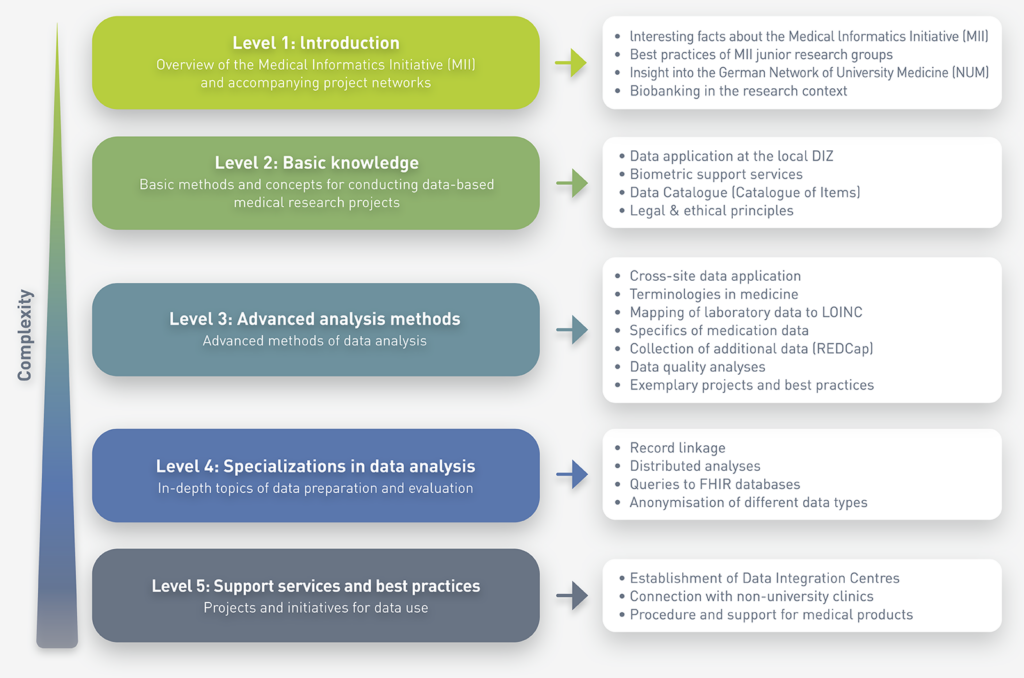
Structure and Content
Structure of the MII-Academy
The MII-Academy supports you in using the services and processes created by the Medical Informatics Initiative. Video presentations provide you with information and practical instructions on how to gain access to routine medical data for your research projects, how to use it effectively and how to analyze it optimally. The teaching and learning units of the MII-Academy are divided into modules that are grouped by topic. Five subject areas are currently covered
The subject areas are designed to build upon each other, gradually increasing in complexity. You are free to start at the level that best matches your prior knowledge. The order in which you go through the subject areas and modules is not predetermined. You can choose the topics based on your individual interests.
There are also no restrictions on how often a module can be used. You can listen to the presentations as often as you like. This should give you the opportunity to use the modules as a short-term refresher.


Below you will find information on each of the five topics:
Level 1: lntroduction
Overview of the Medical Informatics Initiative (MII) and accompanying project networks
In this topic block, you will get an overview of the MII and accompanying project consortia. These other networks include, for example, the Network of University Medicine (NUM) and the National Research Data Infrastructure (NFDI), in particular the NFDI4Health consortium. All of these initiatives aim to process healthcare and study data in Germany and make it accessible in a standardized format in accordance with the FAIR principles (findable, accessible, interoperable, reusable). In addition to the overview module, you will find further links and information on the MII-Academy concept here.
Topics include:
Overview of the Medical Informatics Initiative (MII)
The Network of University Medicine (NUM) at a glance
Introduction to biobanking
Level 2: Basic knowledge
Basic methods and concepts for conducting data-based medical research projects
This subject area provides you with the tools you need to advance your own research questions and work. In accordance with state legislation, medical staff are permitted to use data collected from patient care at their own hospital for research projects. This course is designed to encourage you to make the best possible use of the organizational and technical infrastructures set up by the Medical Informatics Initiative (MII) at its local Data Integration Centers. The content in the basic level mainly concerns the application process for the required research data, ethical and legal issues, relevant documents and potential support services at medical faculties that can help you carry out your data analysis project.
Topics include:
From data request to data delivery - The services of the Data Integration Centers
Legal and Ethical Requirements for Data Use
Biometric support services
Biobanking in the research context
Level 3: Advanced analysis methods
Advanced methods of data analysis
After conducting research on and with the data from your own hospital, it is usually time to expand the database to other hospitals. In order to underpin the diversity and variability as well as the statistical significance of the results, the patient cohort to be included should be enlarged. The German Portal for Medical Research Data (FDPG) provides the opportunity to build up a virtual cohort of patient data from different clinics and to use it for different evaluations. The third level of the MII-Academy provides you with the necessary overview of medical terminology. You will learn how the terminologies are used in clinical routine and how you can use them for evaluations. You will also learn how to record additional data on patients, such as image or analog text findings.
Topics include:
Feasibility Studies with the German Portal for Medical Research Data (FDPG)
Standard Terminologies in Medical Informatics
Mapping Laboratory Parameters in LOINC: Basics and Best Practices
Capturing Structured Data with REDCap
Level 4: Specializations in data analysis
Advanced topics in data preparation and evaluation
Building on the repertoire of knowledge already acquired in the previous subject areas, you will find topics in the specialization level that represent useful alternatives for advanced analyses and research projects. These include distributed data analysis, natural language processing methods for extracting information from (diagnostic) texts and methods for analyzing MRI and CT data.
Topics include:
Language processing in medicine - introduction to text annotation
fhircrackr - Handling HL7 FHIR Resources in R
Personal Health Train - Perform Decentralized Analyses
Primer on privacy preserving - record linkage
Level 5: Support services and best practices
Projects and initiatives for data use
In addition to the technical infrastructures and established organizational processes that were developed as part of the Medical Informatics Initiative (MII) and are now being used in the Network of University Medicine (NUM), there are other projects and initiatives. Although these do not reach the size of MII and NUM, they pursue goals that complement and enrich the already established services. The presentation of such further projects is the aim and content of this topic area.
Topics include:
Project EVA4MII - An introduction to evaluation research
Digital Hub DISTANCE - Intensive care follow-up using the PICOS app
Data Integration Centers at non-university hospitals
Medical Device Regulation
Contact
Leipzig University | Faculty of Medicine
LIFE Management Cluster
SMITH Office
Philipp-Rosenthal-Straße 27
04103 Leipzig
Phone: +49 341 97-16720

